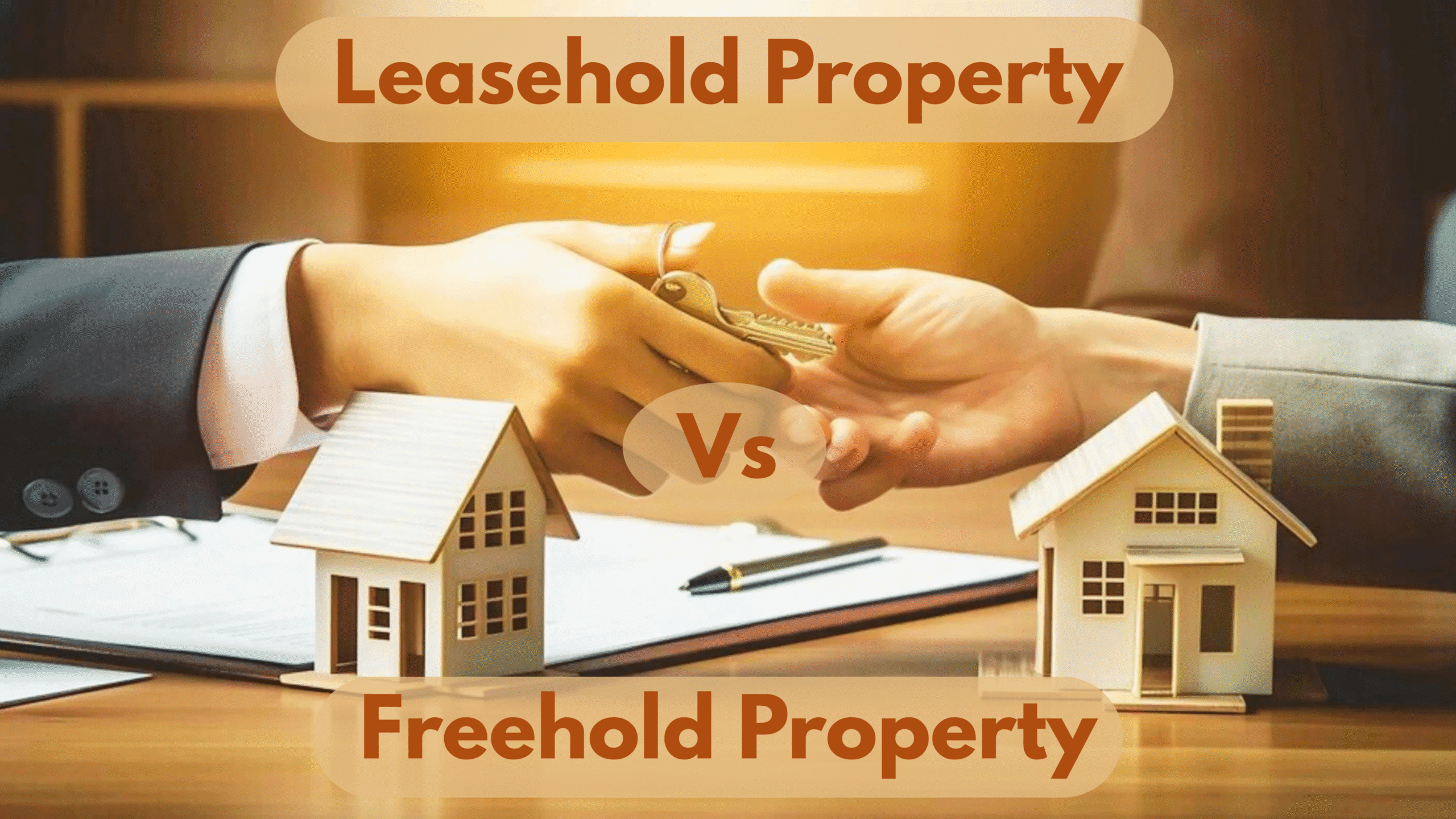Difference Between Leasehold and Freehold Property in India
1.Introduction
When buying property in India, one of the most fundamental distinctions is whether the property is freehold or leasehold. Many buyers, especially first-time investors or NRIs, often overlook this crucial factor, which can significantly affect ownership rights, resale value, loan eligibility, and future planning.
In this blog, we break down the difference between leasehold and freehold property in India, including pros and cons, legal framework, financial implications, and the latest updates as of 2025.
2.What Is Freehold Property?
A freehold property is one where the buyer has complete ownership of the land and the building constructed on it. Once purchased, the owner holds absolute rights to the property.
Key Features of Freehold Property:
Full ownership of land and structure
No landlord or lease authority
Can be inherited, sold, or modified freely
Perpetual ownership (no time limit)
Fewer legal complexities
Common Examples:
Plots allotted by development authorities and later converted to freehold
Independent houses in colonies with freehold status
Freehold apartments registered individually
3.What Is Leasehold Property?
A leasehold property means the buyer has the right to occupy and use the property for a fixed period (usually 30–99 years), while the ownership of the land remains with the government or development authority.
Key Features of Leasehold Property:
You lease the property for a set duration
Ownership remains with the lessor (e.g., DDA, HUDA, etc.)
Need permission from the lessor for sale or modification
Renewal required after lease expiry
May involve ground rent payments
Common Examples:
Delhi Development Authority (DDA) flats
Haryana Urban Development Authority (HUDA) leasehold plots
Properties on cantonment or railway land
4.Key Difference Between Leasehold and Freehold Property in India
| Feature | Freehold Property | Leasehold Property |
|---|---|---|
| Ownership | Complete ownership of land & property | Right to use property for a fixed period |
| Land Rights | Owned by buyer | Owned by authority/government |
| Time Limit | No time limit | Typically 30–99 years |
| Modification Rights | Freely allowed (as per building norms) | Requires permission from lessor |
| Resale Process | Easy, no approvals needed | Often needs authority approval |
| Home Loan Availability | Easily available | May be difficult for short lease durations |
| Conversion Option | Not required | Can apply for conversion to freehold |
5.Legal Rights and Documentation
Freehold Property Documentation:
Registered Sale Deed
Mutation and Khata entries
Property tax receipts
Possession certificate
Leasehold Property Documentation:
Lease Deed from the authority
Allotment letter
Occupancy Certificate (OC)
Ground rent receipts
Conversion application (if applicable)
The legal documentation for leasehold property is generally more complex, and resale often requires NOCs (No Objection Certificates).
6.Ownership Transfer and Sale
Freehold: Can be sold, gifted, or transferred without needing permission from any authority.
Leasehold: Sale requires prior approval or NOC from the lessor. Transfer is time-consuming and involves paperwork.
This difference directly impacts property liquidity. Freehold is more attractive to investors due to easier resale.
7.Home Loan Eligibility
Banks and financial institutions usually prefer freehold properties for disbursing loans, as they come with full legal ownership.
💡 Leasehold Loan Conditions:
If the lease is less than 30 years, loan approval becomes difficult.
Authorities like DDA or HUDA may need to permit the mortgage.
Some banks may refuse to finance leasehold properties altogether.
8.Conversion from Leasehold to Freehold
You can convert a leasehold property into a freehold one by applying to the concerned authority (like DDA, HUDA, etc.) and paying a conversion fee.
Required Documents:
Allotment letter
Possession certificate
NOC from society (if applicable)
Copy of Lease Deed
Property tax receipts
Conversion fee receipt
Conversion makes the property easier to sell, improves valuation, and enables loan eligibility.
9. Pros and Cons: Leasehold vs Freehold
Freehold Property – Pros:
Complete ownership rights
High resale value
Eligible for loans
Better long-term investment
Freehold Property – Cons:
Higher upfront cost
Limited availability in urban zones
Leasehold Property – Pros:
Usually cheaper than freehold
Available in prime locations (DDA flats, etc.)
Can be converted to freehold
Leasehold Property – Cons:
Limited control
Lease renewal uncertainty
May face resale/legal hurdles
Not always loan-eligible
10.Government Policy Changes in 2025
In 2025, several state governments and urban authorities are simplifying the conversion process to encourage real estate transparency.
Key 2025 Policy Highlights:
-
Delhi: DDA now allows online application for leasehold to freehold conversion
-
Gurugram: HUDA simplifies documentation for registry of converted properties
-
Maharashtra: Plans to automatically convert old leasehold plots to freehold by default after 99 years
These steps aim to empower homeowners and increase transparency in property transactions.
11.What Should NRIs Consider?
If you’re an NRI looking to invest in Indian property, understanding the difference between leasehold and freehold property in India is crucial.
🔍 NRI Considerations:
Freehold is preferable for long-term ownership and inheritance
Leasehold may come with restrictions on resale or transfer
Check FEMA and RBI guidelines before buying
Freehold property simplifies repatriation of sale proceeds
Always consult with a legal advisor or real estate expert familiar with NRI investment laws.
12.Expert Advice: Which One Should You Choose?
Choose Freehold Property if:
You want full ownership and fewer legal hassles
You’re planning to resell or lease in the future
You want to raise funds or take home loans
Long-term investment is your goal
Consider Leasehold Property if:
You’re buying for short-term use
Property is in a prime area but unaffordable as freehold
Conversion is possible and you’re willing to initiate it
You understand the legal limitations
13.Frequently Asked Questions (FAQs)
Q1. Can leasehold property be sold in India?
Yes, but with permission from the lessor and after clearing dues.
Q2. Is freehold property more expensive than leasehold?
Generally, yes—because of complete ownership and easier resale.
Q3. Can leasehold property be converted to freehold?
Yes, by applying to the relevant development authority and paying a conversion fee.
Q4. What happens when the lease expires?
Ownership reverts to the lessor unless the lease is renewed.
Q5. Which is better for investment: leasehold or freehold?
Freehold is usually better for long-term investment due to full ownership rights.
14.Conclusion
Understanding the difference between leasehold and freehold property in India is essential before making a real estate investment. Each option has its advantages and limitations, and your choice should depend on your budget, future plans, and risk appetite.
In 2025, with evolving policies and digital processes, navigating this difference has become easier than ever. Whether you’re a resident buyer or an NRI investor, make sure to verify property titles, check authority rules, and seek professional legal advice before signing the dotted line.

